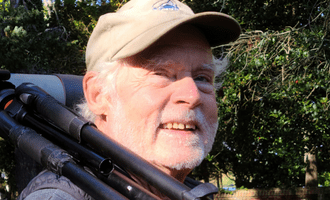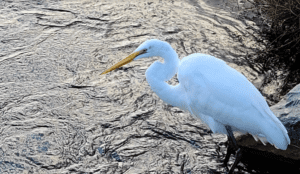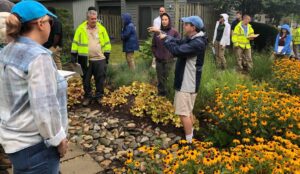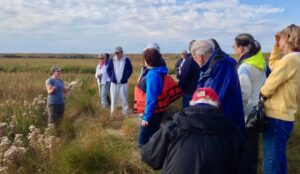This is the second of a two-part course begun during the Winter Semester here at Chesapeake Forum. The parts are independent, so don’t worry if you missed Part I last semester. This second part will provide a unique opportunity to observe the spring migration of songbirds and shorebirds. While the course remains a program for beginners, birders who have had some experience and wish to hone their skills are welcome.
Unlike previous birding courses, most of the teaching will be done in the field, with bird-by-bird, species-by-species, identification. There will be seven weekly field trips: five will be 3-hour outings to local destinations, and two will be all-day trips to more distant locations.
There will be two in-person hybrid class sessions. The first will briefly review birding skills and resources, then proceed to examine the phenomenon of bird migration. The second will consider conservation issues for saving migrant birds across their entire ranges. Due to the importance of being able to get good looks at the birds seen, each participant must have a birding-quality pair of binoculars; 7×42 or 8×42 recommended. Some field birding will require walking distances of up to a mile.
This is a field-oriented course in which bird identification will be learned according to each species seen on a series of seven trips to a variety of destinations and habitats during spring songbird and shorebird migration. It is intended for beginners and those who wish to increase their birding skills and confidence. Two classes bracket a series of seven field tips to different local and more distant Eastern Shore destinations.
Enrollment limited to 16.
2 Recorded classroom sessions on Thursdays from 2:30–4:00 pm:
- Thursday, April 13: Introduction to Bird Migration
- Thursday, June 8: Saving Migrant Birds (Recording not available)
What to Expect: What bird is that? Participants will gain confidence in identifying many bird species that are departing winter residents, summer residents, or transient migrants on the Eastern Shore. In addition to clues such as field marks, general appearance, and behavior, they will see how the relationship between species and habitat provides additional identification information as well as insight into approaches to bird conservation.
Feedback from Wayne’s past courses:
“I signed up for Wayne’s class just for the experience of the remote field trips and they introduced me to places I’d never find on my own. Bravo Wayne and thank you!”
“Wayne’s enthusiasm is contagious. I learned so much from each class session! Being able to put it to practice in the field made this learning experience even more meaningful. The follow up videos were so helpful to review. Please continue to provide outside experiences in the future!”“As always, Wayne’s classes are full of useful information and his field trips are amazing! I particularly liked the focus this semester on the ecology of our land use here on the Eastern Shore. It gives us all something to think about!”
Course Links:




